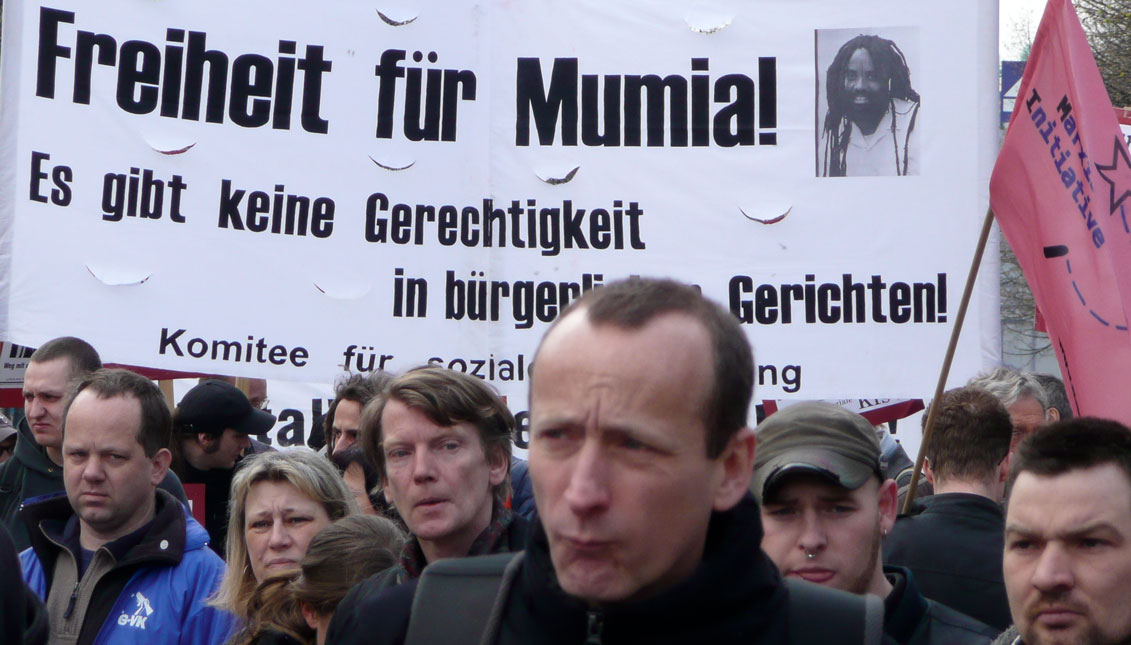
The name Mumia was back in the news recently.
Ongoing antics by authorities in Abu-Jamal case keep ugly spotlight on Philadelphia.
That’s Mumia as in Mumia Abu-Jamal, the award-winning Philadelphia journalist convicted of First Degree murder during a 1982 trial that respected entities like Amnesty International have labeled unjust due to misconduct by police, prosecutors and the trial judge.
It is an article-of-faith among many in Philly that Mumia brutally murdered policeman Daniel Faulkner on 12/9/1981.
However, acceptance of that article-of-faith requires acceptance of irregularities that began at arrest and have continued through appellate review up to the U.S. Supreme Court.
Authorities, for example, claimed Abu-Jamal ‘executed’ Faulkner by standing over him, firing a pistol at Faulkner four times from pointblank range, with only one bullet hitting Faulkner.
But police crime scene photographs show no bullet marks around Faulkner’s body from those three bullets authorities say Abu-Jamal fired but missed. No bullet marks in that circumstance defies basic ballistic science.
Appellate courts have consistently upheld Abu-Jamal’s conviction that initially carried a death sentence. In upholding his conviction courts have curiously denied Abu-Jamal the same legal relief routinely granted others for violations of constitutional rights.
An Amnesty International investigation on Abu-Jamal’s plight, released in February 2000 stated “politicization” had undermined his rights to “fair and impartial treatment” by courts.
The fact that Abu-Jamal’s conviction rests on irregularities by police, prosecutors and, yes, judges is the reason why so many around the world embrace Abu-Jamal as an ‘Exhibit A’ example of injustice in America’s racist justice system.
The matter that thrust Mumia back into the news recently involves an appeal to permit new appeals based upon misconduct by an appellate court judge.
That jurist is the former Pennsylvania state Supreme Court Chief Justice Ronald Castille, a former District Attorney of Philadelphia.
As Philly DA, Castille opposed Abu-Jamal’s appeals. And, later as a state Supreme Court member, Castille opposed appeals from Abu-Jamal.
Such dual-role opposition violates both decades-old judicial conduct directives in Pennsylvania and restrictions contained in a U.S. Supreme Court ruling a few years ago that specifically castigated Castille for dual-role engagement during a Philadelphia murder case.
Castille shreds common sense with his contention that as DA he played no significant role in the Abu-Jamal case…thus, as Supreme Court justice, knew nothing about the case that had generated controversy and attention internationally.
A former top aide to DA Castille once told a reporter that as DA Castille was actively involved in both death penalty and high profile cases.
Castille campaigned for both DA and the Supreme Court as a ‘hands-on’ manager.
Yet when confronted in the Abu-Jamal case, Castille cast himself as a detached administrator.
Castille even defended himself against bias charges arising from campaign support received from Philadelphia’s anti-Abu-Jamal police union with the declaration that four other Supreme Court colleagues received cop union support…thus compounding concerns about probable impropriety.
Employees of Philly’s current DA Larry Krasner now push Castille’s implausible ‘know-nothing’ stance to oppose Abu-Jamal’s latest appeal.
The international stain on Philadelphia from pernicious antics by authorities in Abu-Jamal’s injustice continues…










LEAVE A COMMENT: